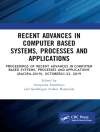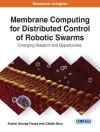The ?rst International Meeting of Advances in Robot Kinematics, ARK, occurred in September 1988, by invitation to Ljubljana, Slovenia, of a group of 20 int- nationally recognized researchers, representing six different countries from three continents. There were 22 lectures and approximately 150 attendees. This success of bringing together excellent research and the international community, led to the formation of a Scienti?c Committee and the decision to repeat the event biannually. The meeting was made open to all individuals with a critical peer review process of submitted papers. The meetings have since been continuously supported by the Jozef ? Stefan Institute and since 1992 have come under patronage of the Inter- tional Federationforthe Promotionof Mechanismand Machine Science(IFTo MM). Springer published the ?rst book of the series in 1991 and since 1994 Kluwer and Springer have published a book of the presented papers every two years. The papers in this book present the latest topics and methods in the kinem- ics, control and design of robotic manipulators. They consider the full range of – botic systems, including serial, parallel and cable driven manipulators, both planar and spatial. The systems range from being less than fully mobile to kinematically redundant to overconstrained. The meeting included recent advances in emerging areas such as the design and control of humanoids and humanoid subsystems, the analysis, modeling and simulation of human body motion, the mobility analysis of protein molecules and the development of systems which integrate man and – chine.
Tabela de Conteúdo
PART1.- Calibration and Validation of a Rigid Body Kinematic Model of Flexure Hinges.- Dynamic Jacobian Inverses of Mobile Manipulator Kinematics.- A Robust Forward Kinematics Analysis of 3-RPR Planar Platforms.- Hierarchical Decomposition and Kinematic Abstraction with Virtual Articulations.- Researching into Non-Singular Transitions in the Joint Space.- MARIONET, A Family of Modular Wire-Driven Parallel Robots.- Using Cosserat Point Theory for Estimating Kinematics and Soft-Tissue Deformation During Gait Analysis.- PART2.- Mechanical Generators of 2-Do F Translation along a Ruled Surface.- Worm-Like Robotic Locomotion in Flexible Environment.- Actuation Strategy Based on the Acceleration Model for the 3-PRPR Redundant Planar Parallel Manipulator.- Kinematics and Design of a 5-DOF Parallel Robot Used in Minimally Invasive Surgery.- Main Theorem on Schönflies-Singular Planar Stewart Gough Platforms.- A Novel Actuation Module for Wearable Robots.- Parallel Robot with Antagonistic Dielectric Elastomer Actuation for Human-Machine Interaction.- Using Redundancy in Serial Planar Mechanisms to Improve Output-Space Tracking Accuracy.- PART3.- Combining Structural and Kinematic Analysis Using Interval Analysis for a Wire-Driven Manipulator.- Multiple-Point Kinematic Control of a Humanoid Robot.- Optimum Design of a Pan-Tilt Drive for Parallel Robots.- LQP-Based Controller Design for Humanoid Whole-Body Motion.- Persistent Screw Systems.- Localisation of the Instantaneous Axis of Rotation in Human Joints.- A Kinematic Observation and Conjecture for Creating Stable Constructs of a Peptide Nanoparticle.- Forward Kinematic Problem of 5-PRUR Parallel Mechanisms Using Study Parameters.- PART4.- The Development of a Reconfigurable Parallel Robot with Binary Actuators.- On the Design of 5R Serial Manipulators with Isotropic Positioning.- A Virtual Mechanism Enhanced Approach for Object Tracking with Humanoid Robot Head.- Tangent Space RRT with Lazy Projection: An Efficient Planning Algorithm for Constrained Motions.- PART5.- Equilibrium Analysis of Tensegrity Structures with Elastic Ties.- Singularity Analysis of Lower-Mobility Parallel Robots with an Articulated Nacelle.- Human Motion Reconstruction and Synthesis of Human Skills.- Overconstrained Mechanisms with Radially Reciprocating Motion.- Control of Bipedal Turning While Running.- Geometrico-Static Analysis of Under-Constrained Cable-Driven Parallel Robots.- The Inverse Kinematics of 3-D Towing.- A Complete Method for Workspace Boundary Determination.- PART6.- Inverse Kinematics of Humanoid-Robot Reaching through Human Visuo-Motor Learning.- Automated Fitting of an Elastokinematic Surrogate Mechanism for Forearm Motion from MRI Measurements.- Self-Motions of 6–3 Stewart–Gough Type Parallel Manipulators.- Constraint Compliant Control for a Redundant Manipulator in a Cluttered Environment.- Geometric Interpolation by Quartic Rational Spline Motions.- Position Level Kinematics of the Atlas Motion Platform.- An Optimum Path Planning for LARM Clutched Arm.- A Simple Kinematic Model of a Human Body for Virtual Environments.- PART7.- On the Development of Low Mass Shaking Force Balanced Manipulators.- Singularity-Invariant Leg Rearrangements in Stewart–Gough Platforms.- Geometric Kinematics of Rigid Bodies with Point Contact.- Singularity Locus of 6–4 Fully-Parallel Manipulators.- The Pre-Stereographic Model of the General Three-System of Screws.- Difficulty of Kinematic Synthesis of Usable Constrained Planar 6R Robots.- Stiffness Analysis of Parallel Manipulators with Preloaded Passive Joints.- Characterization of Parallel Manipulator Available Wrench Set Facets.- PART8.- Constraint-Screw System Based Synthesis of Limb Arrangement of the 3-PUP Parallel Mechanism.- On Structural Properties of Sets of Finite Displacement Screws.- An Autonomous and Safe Homing Strategy for Parallel Kinematic Five-Bar Manipulators.- Singularities of Regional Manipulators Revisited.- Robot-Based Hi L Test of Joint Endoprostheses.- An Algorithm for Real-Time Forward Kinematics of Cable-Driven Parallel Robots.- Numerical Synthesis of Overconstrained Mechanisms Based on Screw Theory.
Sobre o autor
Jadran Lenarcic has been Professor at the Faculty of Electrical Engineering, University of Ljubljana, Slovenia, since 1988. He is Director of the J. Stefan Institute of Automatics, Biocybernetics and Robotics since 2005. He is a member of the executive committee of the International Federation for the Theory of Machines and Mechanisms, member of the Board of the European Robotics network, and memebr of the Executive Board of the European Association of Research and Technology Organisations. He is regular member of the Slovenian Academy of Engineering Science.












